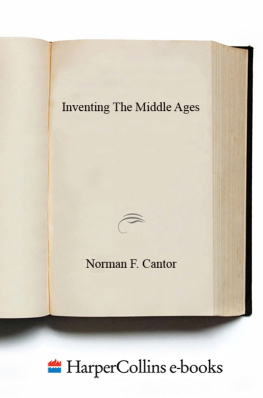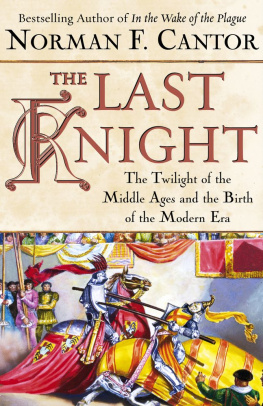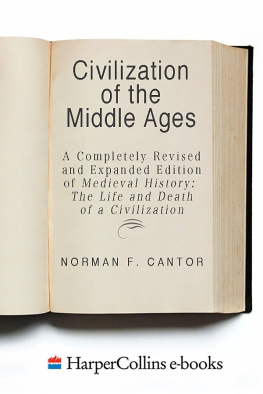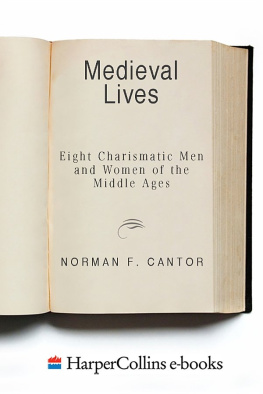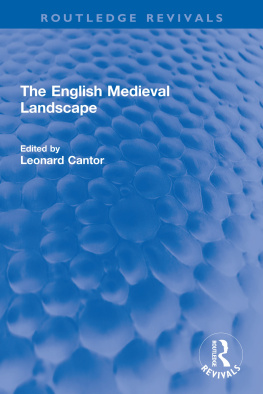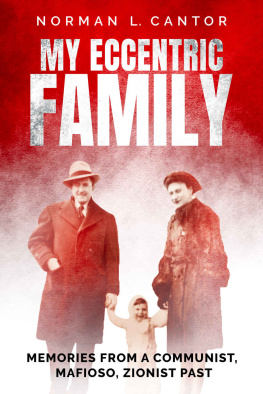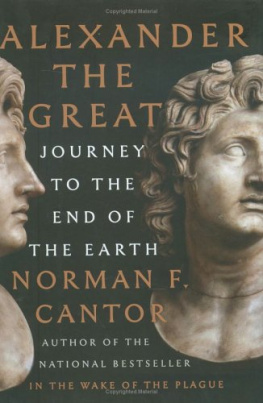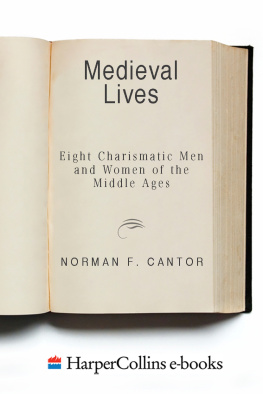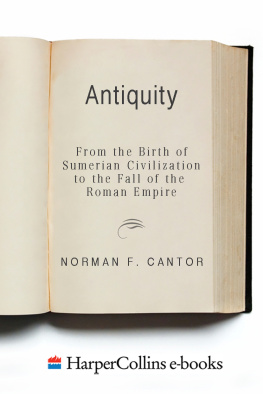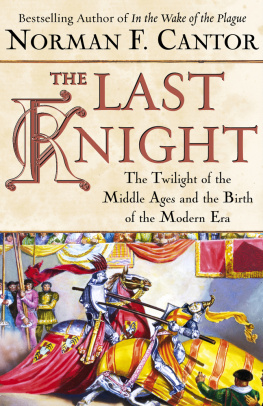For Max
CONTENTS
Guide
This book is the story of the founding era of medieval studies from 1895 to about 1965, through the lives, works, and ideas of the great medievalists, and is an evaluation of their continuing impact, into the 1980s, on how the European Middle Ages are interpreted.
From my own personal acquaintance with seven of the twenty master medievalists on whom this book is primarily focused, from a variety of biographical and autobiographical sources, as well as from accounts passed along to me, I have tried to construct in each instance a life narrative along with an assessment of ideas and an analysis of the continuing impact of these medievalists interpretations.
I wish to thank the following:
Sir Geoffrey Elton, Robert Hanning, Kate Ludwig Jansen, Darlene Levy, Margaret Jennings, Ann Rabinowitz, and Richard Schneider for recently providing important information. They have not read this book in manuscript and are in no way responsible for what I have done with the information provided.
The Houghton Library of Harvard University, for permission to quote from the unpublished letters of Charles Homer Haskins.
The Office of the Dean of the Faculty of Arts and Science of New York University and particularly Dean Ann Burton for providing secretarial assistance.
My secretary, Nelly Fontanez, for careful handling of a difficult manuscript and her skill in the word processing of several drafts.
Peter Lang Publishing of Bern, Switzerland, and the Oxford Magazine for allowing me to adapt a half dozen pages that I previously published in articles in respectively Einbeit in der Vielfalt, Festscbrift fr Peter Lang zum 60. Geburtstag (1988) and the magazines issue of November 1987.
My students at Columbia University in 1964; Brandeis University in 1966; State University of New York at Binghamton in 1973; New York University in 1982, 1987, and 1990; and Tel Aviv University in 1988, with whom the ideas and material that constitute this book were discussed in courses. I have benefited from their comments and suggestions.
Sidney Burrell and Charles Dellheim, who read an earlier draft of the book and made many valuable suggestions.
Joan Raines, for her encouragement and advice.
Elisa Petrini and Randy Ladenheim-Gil, for editing of the manuscript and making it more readable.
Mindy Cantor, who has shared with me over the years her insightful impressions of the great medievalists whom we have jointly met. Mindy has also suggested to me several critical relationships between modernism and medievalism.
Greenwich Village, New York City
CREDO
Like dwarfs standing on the shoulders of giants, we see farther than they.
Bernard of Chartres, northern France, c. 1130
I shall not pass over silently that certain people... dont want to presume to go beyond their venerable predecessors. But having thus covered up their inertia, they dawdle about lazily and deride, ridicule and mock the industriousness shown by others in the quest and discovery of truth. But he who dwells in heaven shall ridicule them; the Lord shall mock them.
Richard of St. Victor, northern France, c. 1160 (Trans. M. D. Chenu, J. Taylor, and L. K. Little)
That learned man [St. Jerome] knew... how obscure truth is, how deep it lies buried, how far from mortal sight it has plunged into the depths, how it will admit only a few, by how much work it is reached, how practically no one ever succeeds, how it is dug out with difficulty and then only bit by bit.
Andrew of St. Victor, northern France, c. 1170 (Trans. M. D. Chenu, J. Taylor, and L. K. Little)
I
BETWEEN ROME AND RENAISSANCE
In France, Germany, and Italy they still call it the Middle Age. In English-speaking countries since about 1840 it is generally referred to in the pluralthe Middle Agessignifying the several distinct suberas during one very long epoch. Whether called by the singular or the plural, the medieval era in Western civilization is the millennium that stretched from the fall of the Roman Empire in Europe (about A.D . 450) to the Italian Renaissance of the late fifteenth century. The question that has engaged the lifetime interest and work of thousands of historians, literary critics, art historians, philosophers, theologians, and archaeologists in modern times is, What happened between Rome and the Renaissance? What was the nature of the European medieval world, and what is its connection to our own?
Interest in the meaning and relevance of the Middle Ages stretches far beyond academia. Books about King Arthur and his Round Table, both fiction and nonfiction, constitute a thriving cottage industry. In 1978 Barbara Tuchman, a distinguished historian although not an academic, published a best-selling medieval book, A Distant Mirror, that demonstrated to almost universal satisfaction similarities between the troubled fourteenth century in Europe and the more depressing moments of the twentieth century. In 1990 no fewer than three Hollywood film companies almost simultaneously announced they were going to produce a new movie about Robin Hood, to replace the jovial 1938 film that starred Errol Flynn and Olivia De Havilland, and a new blockbuster film about the mythic medieval hero is now actually in production. Perhaps on a more exalted level of discourse, the papacy in 1987 prohibited a professor of theology at the Catholic University of America in Washington, D.C., from teaching about sexuality in a manner that sharply departed from allegedly authoritative medieval Catholic tradition. Hagar the Horrible, the rambunctious Viking, is a favorite comic strip. Every summer tens of thousands of middle-class Americans climb into tour buses in London, Paris, Frankfurt, Rome, and Vienna and spend a week or two visiting medieval cathedrals and the remains of medieval castles. Curiosity is thereby stimulated about the people who created the world of castle and cathedral.
In 1984 the English translation of a novel by an Italian professor of medieval literature, The Name of the Rose by Umberto Eco, surprised the New York publishing world by becoming a phenomenal best seller. The popularity of Ecos highly cerebral novel was helped by its being cast in the form of a detective story. Yet the setting was the fourteenth century, and the story is placed in the context of one of the more dramatic conflicts within the medieval church: between the papacy and the radical, or Spiritual, wing of the order of Franciscan friars over the nature of the church and its role in society.
Asked to explain the phenomenal success of his novel, Eco modestly attributed it to a period of renewed interest in the Middle Ages... both in Europe and America. Another comment by Eco puts it more sharply: [T]he fact is that everyone has his own ideas, usually corrupt, of the Middle Ages. The huge popular success of Ecos and Tuchmans medieval books gave new attention to the ideas held about the Middle Ages by the leading academic medievalists of the twentieth century, whose research and insight the two best-selling authors had freely drawn upon. Specifying parallels between the agonies of the fourteenth and twentieth centuries or setting a brilliant detective story within the conflict between the papacy and the Spiritual Franciscans was only a small sliver of the medieval European experience that stretched for a millennium beyond the fall of the Roman Empire. Which additional interpretations or fascinating data loom strongly out of the work of three generations of medievalists since 1900? Which were the colossal personalities and dramatic crises that the medievalists had revealed? What further parallels or contrasts could be drawn between the Middle Ages and our own culture and society? How do the medieval sensibility, imagination, and faith relate to our own set of assumptions and perceptions? These were subjects broached by sophisticated literary agents and editors as they took luncheons in two-star restaurants with academic medievalists, seeking to find at least one who, like Tuchman (but certainly not Eco), wrote suburban middle-class prose.

